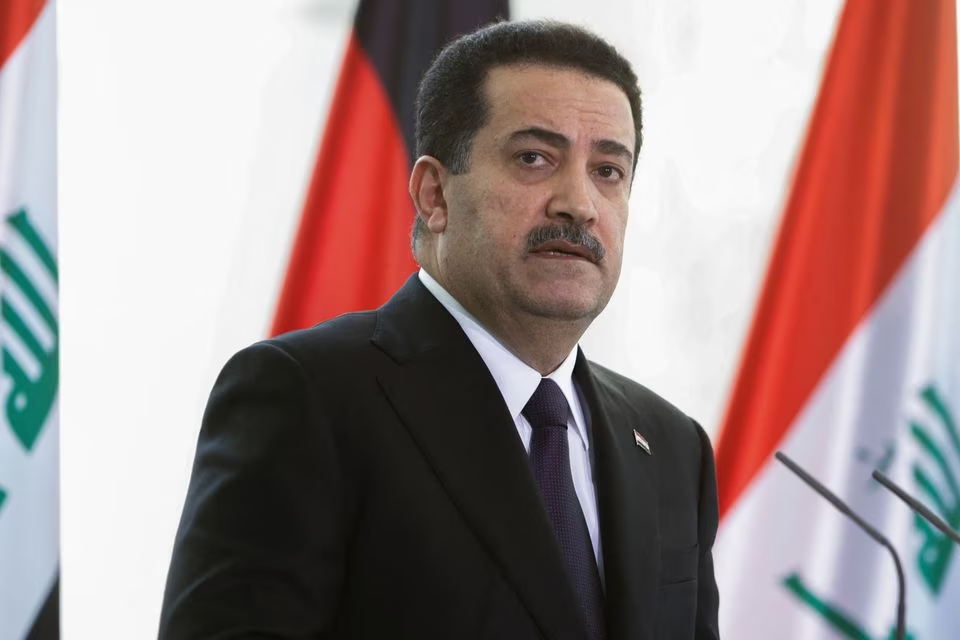Iraq’s Prime Minister, Mohammed al-Sudani, expressed inan interview with the editor of the Wall Street Journal, published January 15, his view that Iraq still needs the presence of foreign forces, which are mostly American. His stance can be understood in the context of various considerations: the request would be legal in view of the continuing fight against ISIS; the need to maintain generalstability in Iraq; the need to ease the Iraqi dinar’s volatility against the US dollar; and the need to adopt a less confrontational stance towards the US.
Iraq’s Prime Minister, Mohammed al-Sudani, argued his countrystill needs foreign forces because the “elimination of ISIS will take some time”. In an interview published by the Wall Street Journal on January 15, Al-Sudani stated that Iraq is threatenedby the penetration of terrorist cells from Syria but does not need forces to fight inside the country. Al-Sudani also argued he doesnot consider it impossible for Iraq to have a good relationship with both Iran and the U.S. at the same time. Overall, the Iraqi prime minister demonstrated diplomatic goodwill towards the US, which indicates he has multiple reasons to call on UStroops to remain in Iraq.
According to the US newspaper, the Iraqi Prime Minister’sassertion that the elimination of ISIS terrorist group needs more time, was in reference to US and NATO troops that train and assist Iraqi units in countering ISIS, but largely do not engage incombat. Nevertheless, Al-Sudani’s remarks stirred active debate on the Iraqi street, as well as political attacks, and demands for specifying a schedule for the withdrawal of all US and other foreign troops from Iraq.
Past Iraqi governments have successively expressed a desire for continued noncombative US military support in Iraq, despiteinternal opposition from several political actors, especially those affiliated with Tehran. For although ISIS control over parts of Iraqi territory was brought to an end in 2017, the group has demonstrated its ability to reemerge through attacks on Iraqi security forces. For this reason, there has been a limited US military presence in Iraq, to provide training, advise and support to Iraqi forces fighting this group.
Multiple Reasons
The Iraqi Prime Minister’s support for indefinite presence of US troops stems from several considerations, the most important of which are:
Legal foundations. As opposed to the US invasion of Iraq in 2003, there are legitimate legal foundations for USmilitary operations against ISIS, which are supported bythe consent of Iraqi governments, as well as UN Security Council Resolution No. 2249 for 2015, which called on states to “take all necessary measures” to prevent terrorist acts committed by ISIS. The fight against ISIS has become a goal of the entire international community, not just Iraq.
According to media reports on Sunday, 15 January, General Erik Kurilla, commander of US Central Command, in describing Washington-led operations against ISIS in Syria and Iraq, referred to “literally an ISIS army” currently detained in Iraq and Syria. He explained that there are, today, more than 10,000 ISIS leaders and fighters in detention facilities throughout Syria, and about 20,000 in Iraq, at risk of breaking out. This is one of the main reasons al-Sudani supports the presence of American troops in Iraq, and has set no timetable for their withdrawal.
The need for stability in Iraq. Al-Sudani’s statements come in the context of strategic dimensions to US calls for Iraq to build balanced relations with the West. Washington appears to be working towards fostering stability in Iraq in order to steady energy prices on the global market, and streamline Iraq’s oil export process, thereby easing the energy burden on US and European partners.
Iraq’s Prime Minister is well aware of US interest in a stable and secure Iraq. The six meetings he has had with US Ambassador to Baghdad, Elina Romanoski, clearly signaled the US Administration’s investiture and support for Al-Sudani’s government. In addition, Al-Sudani’sstatements coincide with his forthcoming visit to Washington, demonstrating Iraq’s inclination to maintain good relations with the US.
Taking a less provocative posture towards the US. Al-Sudani is exerting clear efforts to refrain from provokingthe US. Indeed, Al-Sudani is working to consolidate relations, and to ignore political pressures from allied parties in the Coordination Framework, which put Al-Sudani in office. He is trying to achieve a balance that would allow a successful visit to Washington, strengthen support for his government, and prevent any threats against American presence. He is aware that the previous Kadhimigovernment had signed an agreement with the US administration on 31 December 2021 stipulating the continued presence of US troops consisting of 2,000 military personnel.
Al-Sudani is acutely aware that Iraq’s current security resources are insufficient to provide effective security for US interests inside Iraq: the bases, equipment, and military advisers engaged in training, and intelligence work. It is of note that attacks by militias loyal to Iran on US bases has declined since Al-Sudani took office, which highlights the significance of his request for continued US military presence, and his wish to avoid confrontations over security issues with the US.
Mitigating volatility in the price of the Dinar against the US Dollar. Sharp fluctuations in the price of the Iraqi dinar against the US dollar are a reflection of US restrictions on the supply of US currency to Iraq. The US is signaling that Iran should not assume that Al-Sudani’s government will provide Iran with the means to breach US sanctions. Thus, the “dinar crisis” is one of the reasons Al-Sudani is choosing to show goodwill in his statements concerning US military presence.
Al-Sudani is also aware of the difference between Iran’s “declared” and practical stance concerning US troop presence in Iraq. Despite Tehran’s declared position – andthat of its affiliated groups within Iraq- on the necessity of US military withdrawal from Iraq, it is well aware that a US withdrawal may lead to the US insisting Iraq comply with sanctions on Iran. Iraq would ne unable to sustain suchsanctions, and it currently relies on a US exemption that isrenewed every (90) days, to obtain gas and electricity imports from Iran. If Iraq would be forced to comply with US sanctions, Tehran would lose a major source of hard currency, in the context of US and Western sanctions.
In sum, it can be argued that the statements of the Iraqi Prime Minister, Mohammed al-Sudani, are an attempt on his part to win over Washington, and to strengthen Iraqi-USrelations to help solve some of Iraq’s security and economic problems. These statements remain within the confines ofimplementing the agreement reached between the US administration and the former Khadhimi government on the presence of US troops, and no doubt come as a result of an understanding with the political factions that brought him to power regarding the implementation of this agreement.


